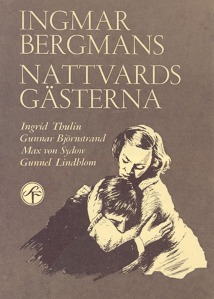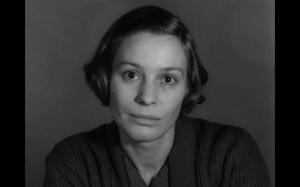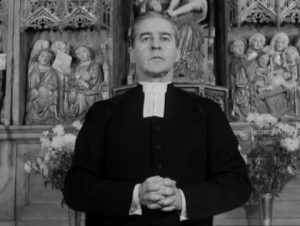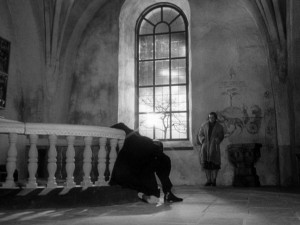This 60s Movie: Nattvardsgästerna (Winter Light) (1963)
/
Within my project to watch any movie I’ve missed in the last 7 years (since I've become a teacher and time has become increasingly shorter), I started a new project for myself. Watching a random movie from a certain decade, that I haven’t seen yet, to see how far it represents its time. We start with my favourite decade: the 60s.
The movie is an Ingmar Bergman movie, a Swedish black&white movie from 1963, about a priest who struggles with his faith. This is my first Bergman movie and although I thought I wouldn’t like it because of the subject matter, I was actually impressed. Mostly with the directing as Bergman has a very firm grasp on his movie and is relentless in showing the priest Tomas (Gunnar Björnstrand) fighting with himself and everyone else about his spiritual future. I was really impressed with the use of real lighting (the shot with sun through the window as Tomas breaks down is brilliant), the subtle camera moves and the close-ups. What worked especially well for me is a scene in which Tomas reads a letter from Märta (Ingrid Thulin), his lover. He dreads reading that letter for a long time and when he starts reading it out loud, the scene switches to her, telling the words directly into the camera, looking at us. This maybe goes on for a bit too long, but it’s still very effective. There is almost no sound in this movie besides the dialogue, so that when there are other sounds, their impact is huge. The acting is excellent throughout. It’s a really well-made and well-acted movie.

But how does it fit into the 60s? Twofold: first, there is a very specific reference as a man (a young Max von Sydow) is so scared of the threat of a nuclear bomb from China that he considers killing himself. Second, the priest’s doubts about his faith and himself echo perfectly the mood of the time. Belief systems were questioned and things that had seem to be clear suddenly became uncertain. Tomas is a good representation of that spirit, especially of the doubts people went through. It is scary to let go of cold convictions and conventions that up that point made up your world. He suddenly feels inadequate and useless. When it is asked from him, he goes through the motions because that’s what people expect but in the first scenes you can already see how hollow those rituals are. They don’t mean anything anymore. It’s a very interesting perspective of that time.

But while I think the movie fits perfectly into this turbulent decade, at the same it struck me how uncannily modern the movie feels. With some slight changes, the movie could be almost the same today and it would still feel the zeitgeist of its era. A priest who is doubting his faith does not sound like an outdated phenomenon. People considering suicide because the world they live in scares them does not sound like a thing of the past (terrorism, financial crisis, nuclear fallout, World War III, etc). The way they talk, especially Tomas, never sounds dated because he is so raw and brutally honest at times while his pretence in some situations also rings true to the roles people play today. The different kinds of characters we see in the first scene represent the same categories people fall in today. Sure, the movie as it is made does not completely fit into our modern viewing habits but I’d say that even its style is not too far away from related movies of our age, especially considering that it wasn’t a big Hollywood movie, so that comparing it to a similar indie or foreign movie would work rather well.
In the end, the movie asks questions that most people today typically don’t dare to ask themselves: Do we really believe in what we are doing? Can we allow our doubts to take hold of us? What do we find, if we look beyond our rituals and roles?


